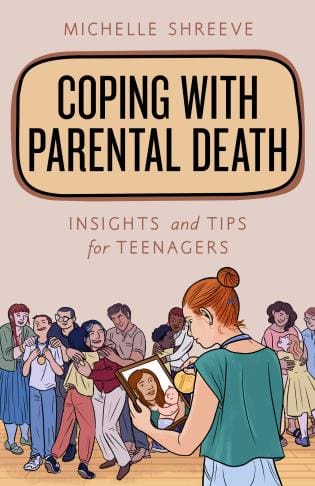In my youth, I started writing about my personal life via short stories while at school or even through poetry while at home. I wrote all the time, as that was my outlet while I was processing the death of my mother. I wrote letters to my friends and tried to help others. After high school my writing turned to journalism, writing for newspapers and magazines, and even earning two master’s degrees in English and Creative Writing. My master’s degree thesis project employed autoethnography to explore how bibliotherapy (reading) and scriptotherapy (writing) can help children and teens cope with the death of a parent, as I utilized such methods myself. While wrapping up my master’s degree, I wrote my first book, Parental Death: The Ultimate Teen Guide, to help children and teens cope with the death of a parent; it was traditionally published and released in 2018 from academic publisher Rowman & Littlefield. I’m proud to announce that this week, on July 13, Rowman & Littlefield will traditionally publish my second book, Coping with Parental Death: Insights and Tips for Teenagers.
Coping with Parental Death: Insights and Tips for Teenagers
Writing about something painful can be challenging to say the least. It’s no easy task and a person has to get to a certain point in their personal healing and coping process to be able to do so. Yet, the reward is for me is huge knowing that I’m helping others to heal and cope by being brave enough to share my own personal story.
In 1993, I was nine years old, and my mother passed away. She died from AIDS-related pneumonia when she received an HIV-tainted blood transfusion while living in the Bay Area, California. As a child, seeing your parent sick is not something easily forgettable as one turns into an adult. No child should ever have to see their parent sick, just like no parent should ever have to watch their child get sick.
It was painful to watch my beautiful mother go in and out of the hospital, especially when other mothers were out spending quality fun time with their daughters. It felt unfair, and my mother grew sad towards the end when she realized she wouldn’t be able to stay much longer.
Living through the experience of losing my mother as a young child has changed my life forever. Almost 30 years later after her death, I still miss her and think of the memories I shared with her every day. Something I’ve learned through researching and writing about this topic is that the pain of losing her will never ever go away. I’ve learned to move forward in life with that pain as that’s what life forced me to do– it’s what life forces everyone to do after they lose a loved one.
I took my personal experience of losing my mother at a young age and channeled what I learned along the way in order to help other children, teens, young adults, and grieving families navigate this situation. It wasn’t easy, and a lot of times I had to walk away from the computer or pause my writing, as my past and painful memories were too much to process at that moment of writing. I hope that by sharing about my painful past that maybe the words I wrote in both books can help youth navigate their grief in a healthy, positive way.
Again, neither book was easy to write but I’m thankful to know that now there are two additional resources that grieving children, teens, and families can access to help them…resources I never had. I look forward to continuing to explore my story, my books, and my processes as I continue autoethnographic exploration in my “Processing Parental Grief” series here at The AutoEthnographer.
Featured image by Dim Hou on Unsplash I The AutoEthnographer
Editor’s note: As an Amazon affiliate, we may earn from your purchases of items in this article; thank you for your support!










